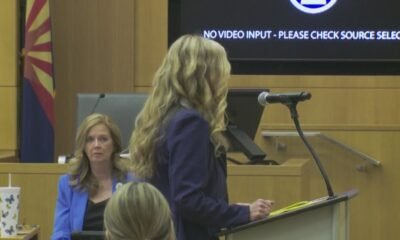Ben Toma
Toma and Petersen Contest Transgender Lawsuit Verdict

Arizona Republican Leaders Seek Federal Court Protection Over Transgender Sports Law Inquiry
The state’s leading Republican lawmakers, House Speaker Ben Toma and Senate President Warren Petersen, are appealing to a federal court to shield them from revealing their motives behind supporting a law that bans transgender girls from participating in girls’ sports.
Their attorney, Justin Smith, argues that U.S. District Court Judge Jennifer Zipps was incorrect in her decision to compel them to answer questions posed by lawyers representing transgender girls challenging the law.
Smith acknowledges that Toma and Petersen chose to engage in the lawsuit rather than allowing state schools chief Tom Horne to solely defend the 2022 ban. However, he insists that this involvement does not negate the legislators’ privilege against explaining their motives in court.
The outcome of the 9th Circuit ruling is pivotal. Historically, the constitutionality of legislation is evaluated on its text rather than the motives behind it. Smith referenced longstanding precedents that shield lawmakers from scrutiny over their legislative intentions.
However, the current case, which alleges the law contravenes the Equal Protection Clause, brings the legislators’ intent into question. Judge Zipps stated that determining whether the law was crafted with “discriminatory intent” is relevant to its legality.
Her ruling permits discovery to potentially reveal whether the Arizona legislature had a constitutionally acceptable purpose when enacting the law. Given that Toma and Petersen actively intervened in the lawsuit, Zipps maintains they must comply with deposition orders and document submissions.
The immediate case concerns two transgender girls who oppose the 2022 statute, which mandates segregated sports teams in public and participating private schools by biological sex, explicitly barring male students from female teams.
Advocates for the law argue it’s necessary due to inherent biological advantages males possess. Judge Zipps, appointed by former President Barack Obama, temporarily blocked the law’s enforcement against these two plaintiffs, ruling it violated Title IX, which prohibits sex-based discrimination in education.
The broader implications of Zipps’ pending permanent decision could spur similar legal challenges statewide. While Attorney General Kris Mayes chose not to defend the law, she permitted Horne to hire his own counsel. Horne argues the law is essential to prevent unfair competition and physical harm to biological girls, dismissing claims that prepubescent or puberty-blocking transgender girls lack competitive advantage.
Toma and Petersen, seeking to uphold what they term “unique legislative interests,” opted for separate legal representation. This decision led to document requests and deposition demands from plaintiffs’ attorneys.
In their 9th Circuit filings, Smith urges immediate intervention to prevent irreversible damage, asserting that once legislative motives are disclosed, confidentiality can’t be restored. He emphasizes that legislative privilege remains intact unless explicitly waived, which he claims hasn’t occurred in this instance.
Smith cautioned that compelling high-ranking legislators to testify about their intentions raises constitutional issues tied to the separation of powers. He asserts that merely participating in a lawsuit doesn’t nullify their legislative privilege.
Judge Zipps counters that by asserting their legislative intent and defending the law’s non-discriminatory nature, Toma and Petersen have made their motives a pertinent issue in the lawsuit, which alleges a violation of the Equal Protection Clause.
The state must justify that its sex-based classification achieves a significant governmental objective, making legislative motives legally pertinent.
Smith notes that Toma and Petersen have provided over 1,100 pages of documents but withheld five deemed “privileged,” originating from other legislators not party to the lawsuit. Zipps described withheld emails as significant to the statute’s enactment, including “talking points” about the law.
No date has been scheduled for the hearing.


















